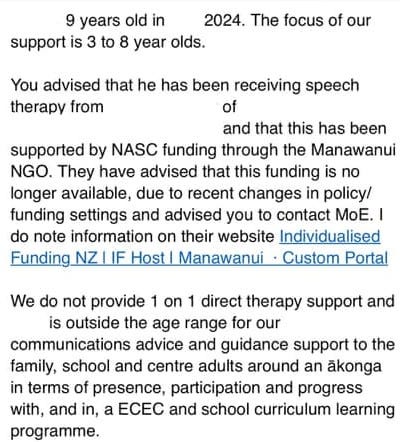Vibes as "policy"
MOE Learning Support staff are telling parents their children are "too old" for speech-language therapy, despite this not being an evidence- or policy-based approach.
Last month I wrote about the lack of culturally competent speech-language therapy (SLT) resources for ākonga Māori in need of speech/language support:
Unpicking embedded colonialism
This post goes round the mountain a bit…do bear with me as I walk through some of the complexities and reflections. Firstly, I share my own experience, then I link it to recent research findings on the topic. This is a longer post than normal; I’ve debated all week whether to share it or not - the personal is political, but I’m never sure how much of th…
Turns out, Learning Support at the Ministry of Education (MOE) are somehow doing even worse at supporting children in need of Speech-Language Therapy (SLT) than I was aware. I am quite stunned at the callousness on display for struggling children.
Parents from Kāpiti, Gisborne, and Hamilton have all shared with me emails, screenshots, and conversations they have had with MOE-employed Learning Support/SLTs who have denied their child much-needed speech-language support, for no reason other than their child is “too old”.
These are 9-, 10-, and 11-year-olds being told by MOE Learning Support and SLT’s that their communication difficulties are ‘embedded’, that they are “outside the age range for our communications advice and guidance support”, and that “speech therapy once a fortnight or once a month will not change the way they talk”.
This is patently false.
There is a fairly solid evidence base for speech-language therapy for teens and young adults - I listed a handful of easily accessible items:
In this post, Dr. Ruth Stoeckel and Dr. Shelley Velleman April (2022) give practical and workable advice on working with adolescents and older children who have childhood apraxia of speech. They also link to the peer-reviewed, published literature on the topic. Nowhere is it indicated that working with teenagers is ‘pointless’ or a ‘waste of time’.
This site has a whole raft of resources for working with teenagers and acknowledges that there is indeed value in working with teens.
This first-person account from a young adult describes the value of speech-language therapy and notes that he was discharged from the service when he was 15-years of age.
Denying 9-, 10- and 11-year-olds speech language therapy based on their age is most definitely not evidence-based.
Turns out, it is also not policy based.
I OIA’d the Ministry of Education, requesting their policies and evidence-base for denying children speech-language therapy over the age of 12. (This was before I realised under-12’s were also being denied!)
Remember - these are 9-, 10-, and 11-year-olds being denied much-needed supports.
There is no such policy to deny support based on age:
It rather seems that Learning Support staff in the regions are making these decisions based on “vibes” - or, more likely, budget constraints.
At this stage, I am only aware of those with parents who are stroppy enough to question it and connected enough to raise it with me. I haven't gone further or wider to ask beyond my current connections. Which is to say, if these three have bubbled to the surface without me really going looking, how many more children have been denied support?
My concern is that this is a systemic issue, not isolated cases.
One of the responses back from the Ministry of Education was to tell me to tell parents to make a formal complaint. While this can be a useful process for managing one-off issues, it is unhelpful for systemic ones. Additionally, parents should not have to go through the tiring and harmful complaints process to access basic therapy support. It places additional administrative burden on already exhausted parents and is an unfair ask, on top of all that they are advocating for and managing.
It is clear to me, given these cases and the OIA response, that Learning Support staff and SLTs are lying to parents in order to manage their waitlists, workload, budget constraints, and/or imposed outcome requirements. I get it, I really do.
But the answer isn’t this.
The response to ministerial pressures shouldn’t be to punch down on our most vulnerable, to make up stories to tell parents to justify poor decision-making, or to pretend they are meeting targets and closing waitlists.
It is totally unacceptable - and it’s our kids who are paying the price.





OMG 😱😥 Firstly, I think you are correct that staff are trying to manage their $$ resources & are deliberately misleading parents - I have some sympathy for them, but well-established historical precedent is that the only way to affect change (in this case have a hope of getting more funding) is to be transparent as to what the problem is. If parents were told "our funding has been cut & so we are concentrating on younger children where we hope we can make the most difference, but if we had the funds we would absolutely work with your older child", then parents would have the truth & be able to write articles, write to MP's, band together in support groups etc. As it is ⁉️
👍Thanks for elevating this - I don't need a child needing this resource to know it should be available to childen of ALL ages, because it is beneficial for them individually but also ALL OF US when they go out into the world being able to be their best 🫂
My youngest received some MOE SLT support when she was 7yo, but discharged because her speech was within what they considered acceptable. This really surprised the specialist who assessed her with autism and mild intellectual disability, both of which are evident in her speech.. but there we are. And as usual, I can't use her IF to pay for the support MOE and MOH won't provide.